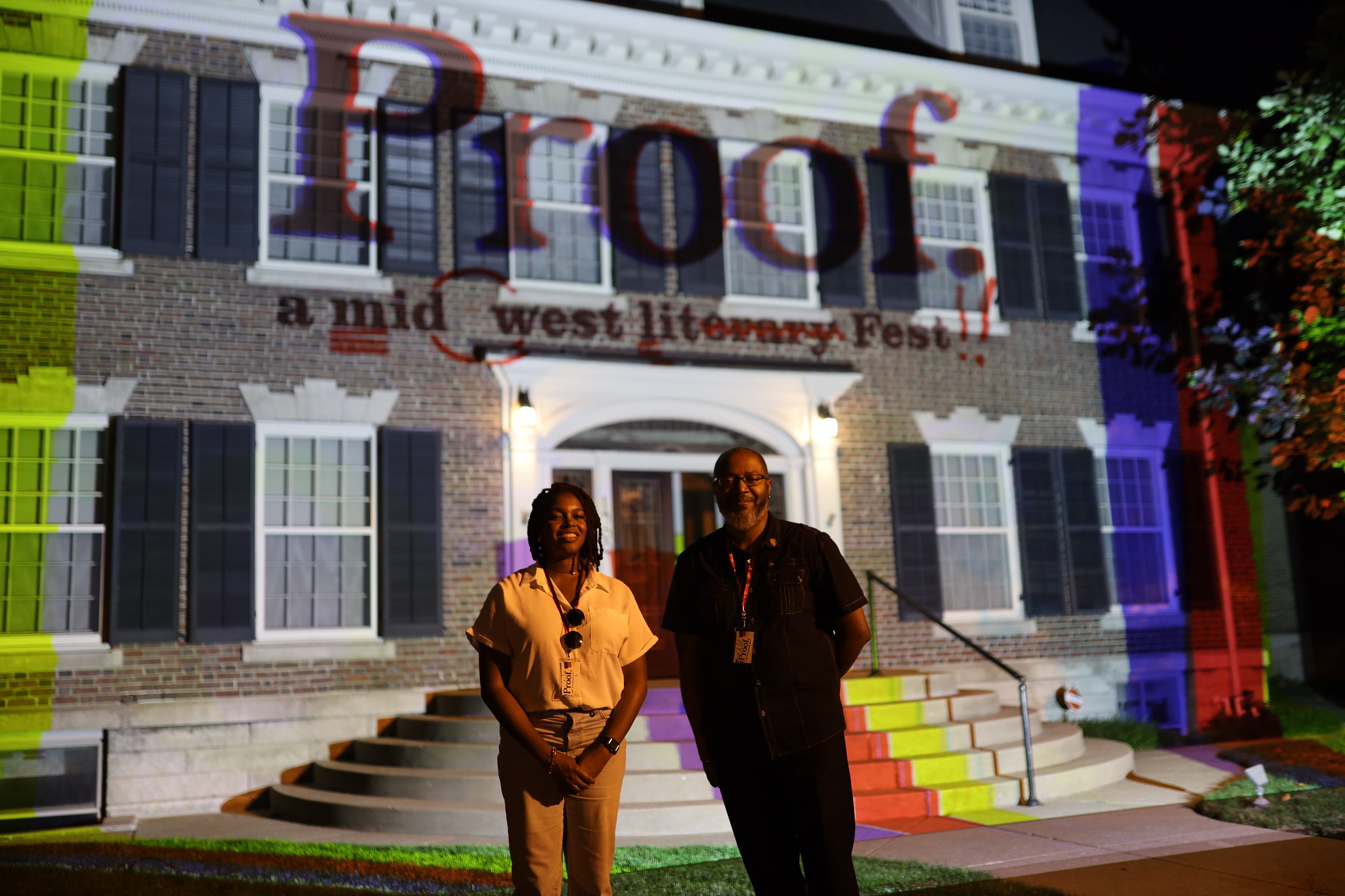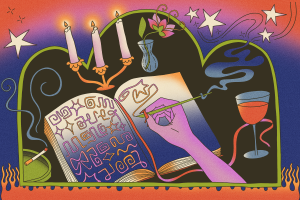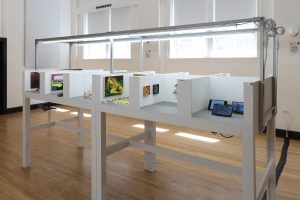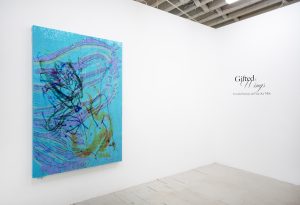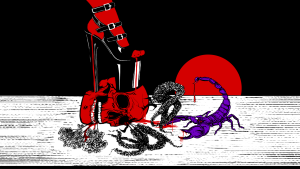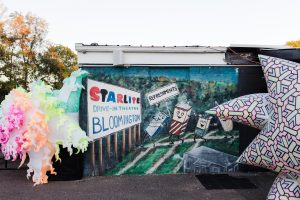I grew up in Indianapolis. It’s the city that raised me and held me during a turning point in my life, it’s the place where I met friends who are now family. It’s the place that first showed me what is possible when artists come together and create something experimental and radical for the community and, perhaps more importantly, for themselves. As a teenager, I saw my best friend’s sister, Nicole Atkins, host crowded and lively exhibition openings in her gallery-cum-hair salon, Alchemy. I saw performances that broke down the boundaries between audiences and performers by the collective Know No Stranger. I saw participatory and innovative exhibitions put on by Big Car, which has become an art staple in the Indy arts community as a nonprofit with their own building, radio show, podcast, public arts program, a row of artist houses, and so much more.
Once I witnessed this, there was no going back. I was immediately pulled down an art-focused life path. My story is one that sometimes surprises folks who have never been in Indy (or Indiana)—but they are not solely to blame (something I’ve come to terms with). People often assume that, if they don’t know what’s going on in a certain place—like Indy—they assume nothing is going on, which is partly due to the media’s biased and or (lack of) coverage of Midwestern geographies. Of course, this is never the case, and sometimes you just have to approach a place with curiosity and just ask.
Over the past five years, there’s been a sudden boom of new bookstores opening in Indy: Loudmouth Books, which specializes in banned books; The Whispering Shelf, a cozy third space (which stocks a great selection of horror!); Dream Palace, which regularly hosts readings, writing workshops, and other events; Tomorrow Bookstore, which always has the newest releases. As the literary scene continues to grow in Indy, the need to support local writers grows as well. Local poets Chantel Massey and Mitchell Douglas, who are embedded in the Indy lit scene, understood this need and, during a reading at the Jazz Kitchen for the celebration of Adrian Matejka’s book Somebody Else Sold the World, they dreamed up Proof: A Midwest Lit Fest.
Co-organized by the two in partnership with Indiana Humanities, Proof brought together local booksellers, poets, authors, literary magazines, spoken word artists, and more to celebrate and showcase local and regional talent and firmly emphasize the Midwest’s role within the current and historical literary landscape. The festival’s name is two-fold: the festival is “proof” as in evidence—evidence of the thriving literary scene in Indy and a community that supports its writers and readers. And a “proof” is also a manuscript. As Douglas describes it, “a proof opens up the opportunity of revision.” Proof: A Midwest Lit Fest does all of this and more—it is a way to revise that tired (and frankly, annoying) narrative that there is not much happening in Indiana. The writers and lit community have been doing the work, the proof is there—you just have to look.
Proof: A Midwest Lit Fest took place at Harrison Center for the Arts (1505 N. Delaware St., Indianapolis) on October 5, 2024. This conversation with Chantel Massey and Mitchell L.H. Douglas has been edited for length and clarity.
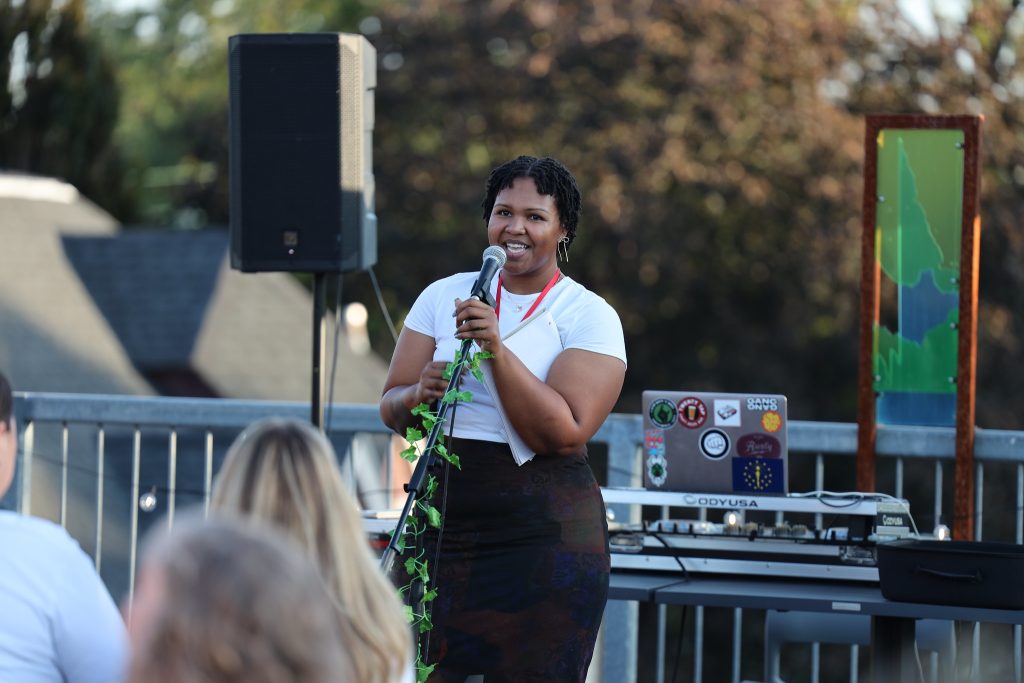
Christina Nafziger: I’d love to start with introductions. Would you mind describing your own personal practices in your own words? I’d also love to hear how you know each other or how you met.
Mitchell L. H. Douglas: I think it was both of us being on the board of Word As Bond. That’s how we met, which was a while ago. Word is Bond is a youth organization that two friends of ours founded: Ashley Mack-Jackson and Rashida GreenE.
Chantel Massey: It’s a youth poetry organization where they take young people to local and national slams and they prepare them for a writing career or just some type of professionalism in writing.
MLHD: That was kind of cool because we were both dedicated to that. And I think what happens when you get on boards, especially with arts organizations, you start to see like, ‘ah, here’s other like-minded artists.’ I think that sets you up for other good relationships that keep going in your creative and professional life.
So that’s how we met. But thinking about artistic practice, I’m a poet and a visual artist, and I’m just starting to get back to my visual art. I’ve been writing poetry for quite a long time. I’ve called myself a poet since I was 13. I was a co-founder of a group called the Affrilachian Poets at the University of Kentucky that included Nikky Finney, Crystal Wilkinson, and Frank X Walker. That’s what got me on my education and into a poetry community. Then I went and got an MFA later at IU Bloomington and studied with Kevin Young. I’m now an associate professor of English at Indiana University, Indianapolis. (Formerly known as IUPUI.) I’m also a person that just believes that art improves the quality of your community. So, it’s not only [about] being here and being a poet, but [also about] reading, helping others, mentoring when I can, and then meeting other people that are active and have the same mindset, like Chantel.
CN: Thank you for that. The Affrilachian Poets—is that something that’s ongoing?
MD: Yeah, there is no end to the Affrilachian Poets really, because we are basically friends and family that are now teaching. So we’re at the University of Kentucky and we’re really teaching all over the country still. But, you know, there’s the art, but there’s also pedagogy there too, right? So teaching is also part of our art.
CN: Affrilachian is such a great word!
MD: Yeah! “Affrilachian” was invented by Frank X Walker, one of our co-founders, and it’s also in the Oxford English dictionary now. Being a poet that creates a word for the dictionary is cool.
CN: That is really cool! As far as visual art, do you mainly work in collage?
MD: Yeah, and it’s changing. Materials are changing. I have all these new plans and things that are happening now. So it’s an exciting time for me and my art.
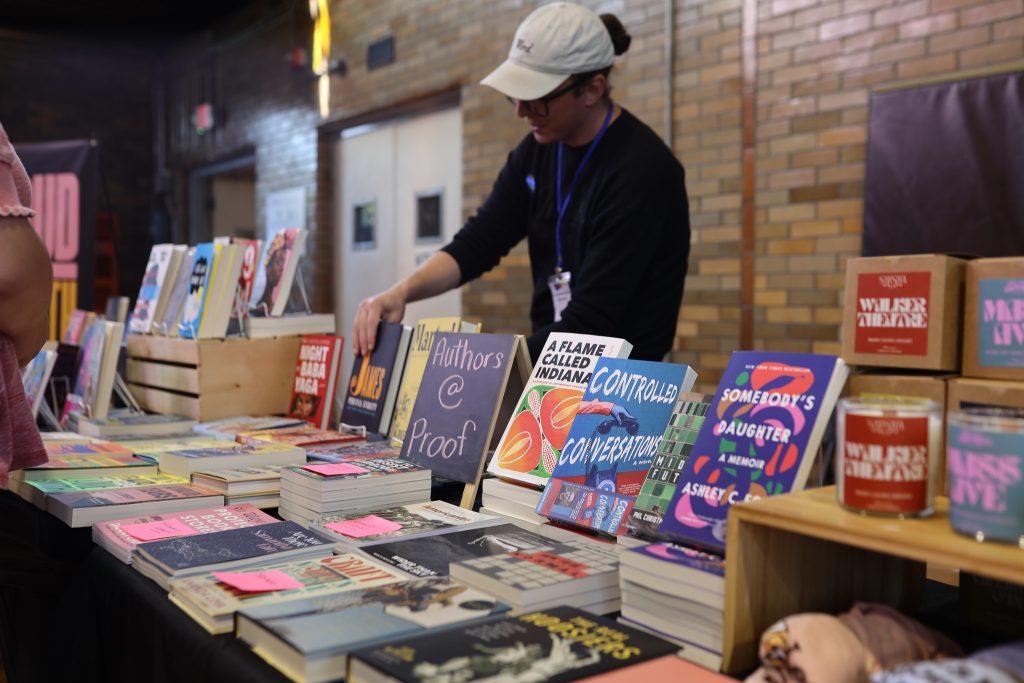
CN: That’s exciting! I saw on your Instagram a piece of yours, Mitchell, that’s currently on display somewhere?
MD: Yeah, that was over the summer at Indy Art Center, and that was really the first in-person show I’ve been in and that was a juried show, so that was really cool.
CN: Chantel, would you like to describe your practice?
CM: Yeah. I am a poet and teaching artist. I’m also currently a student in an MFA program [for Creative Writing with a focus in poetry]. So those are where I am landing these days. I love to collaborate and I love to dream up things with Mitchell and other people in the city [on things] that haven’t happened or that we’d like to see happen and just have fun bringing it to life. I’m also the founder of a literary arts organization called UnLearn Arts, and once I get outta school I’ll [be able to] dive back into it.
Unlearn Arts is currently partnering with the poet Too Black and Black Hub at Butler University to create programming there. Currently we are working on bringing conversational and poetic engagement to their campus, like inviting poets and writers on campus to not only share their work, but also to have students engage with their work. We’re hoping that it will be very organic and communal. I’ve also been writing for a long time since I was probably, I wanna say, 10, which is when I remember having my first poem and it was about my family. I remember it was a blue gel pen that I wrote it in, and I read it in front of everybody. [laughs] My first poetry competition was when I was 12. I entered the Etheridge Knight poetry competition that they used to have here at Glendale Library, and I came in second place to a girl who talked about trees. And I was really upset about that! I was like, what I shared was a lot deeper than your poem about trees. And even then you weren’t talking about anything particularly special about trees—you’re just talking about noticing trees. And I was really upset. (laughs) I guess from then on I declared I’d be a poet for real.
So yeah, that’s kind of where I am. And then just to say, Unlearned Arts is a literary arts organization that started out centered around Black women and non-binary writers, and then I would meet people who made it clear to me that Blackness is a global experience and expansive. A lot of people brought in Afro hyphenated other identities. Then it evolved into BIPOC focused for women and femme writers. So that is the community that I hope to serve with that organization.
CN: Thank you so much for that explanation. I think writing can be kind of insular, so hearing different ways of bringing it out into the world in engaging ways—especially what you’re saying, Chantel with what you’re doing at Butler—is so important. There are so many people I know who told me they don’t like poetry or that they don’t get it, and then I bring them to a poetry reading where you’re hearing the words from the person who wrote it and it changes their whole perspective. It completely opens up that world for them.
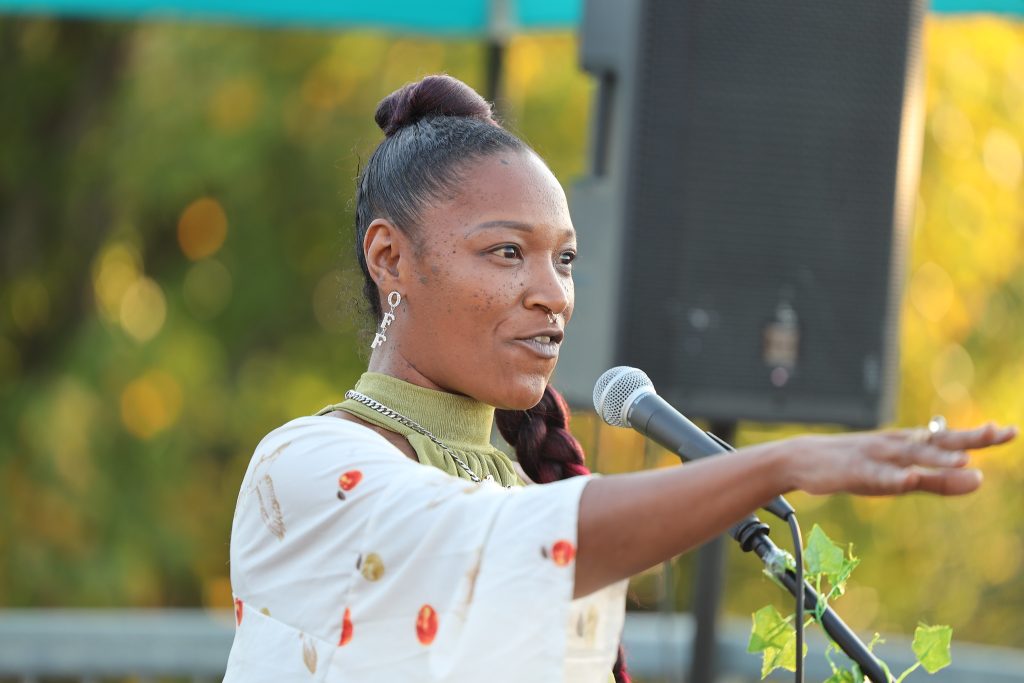
CM: Yeah. Yeah.
MD: That is the best way to see poetry, right? I remember somebody I knew that taught Shakespeare in a high school program said the best way to experience Shakespeare is to see the play, not to read Romeo and Juliet, but to see Romeo and Juliet.
CN: Definitely. Completely agree. I’d love to hear about the Midwest Lit Festival, Proof, that y’all have organized. I’m curious, what sparked this idea? What’s the impetus behind creating the festival? What needs or desires are y’all, wanting to fill within either the Indianapolis (Indy) literary community, or the regional Midwest literary community?
CM: Mitchell and I had a reading at the Jazz Kitchen. We went outside and we were just talking, and next thing you know, we just had all these ideas of things we wanted to do. We had just got done speaking with Indiana Humanities about things we’d like to see, and so as soon as we had all these ideas, we circled back with them and everything just kind of kicked off from there. We’ve had a few other events that we’ve partnered with them on and I think a festival was always in mind, but we just didn’t know how it was going to play out. This year, it felt like this was the time.
In terms of the name, we met with Megan [Telligman] at Indiana Humanities, and she was like, when you all come up with the name, just, just let me know, but we need it quickly. And so [Mitchell and I] were like talking about it and we finally came up with Proof. Literally right after she left, we walked to her office very excited and enthusiastic and [said], actually, Megan, we have to tell you the name and why this is the name now. [Laughs] So everything just kind of went off from there.
The initial need we’re hoping to fill right now is to provide proof that Indy is a part of the Midwestern artistic and literary world, because a lot of times Indiana is like the middle child. It just gets forgotten. So many people come here and they leave and they go somewhere else, and then they’re like, “yeah, but I’m from Indiana.” It’s kind of this forgotten place. So we first wanted to bridge that connection. Indiana is also a huge part of this literary landscape and we’re also part of the Midwest—and because we’re part of the Midwest, it has also impacted Indiana. So we appreciate the connections that exist in the Midwest and we hope to highlight that and provide proof that this relationship is important and our literary presence is important.
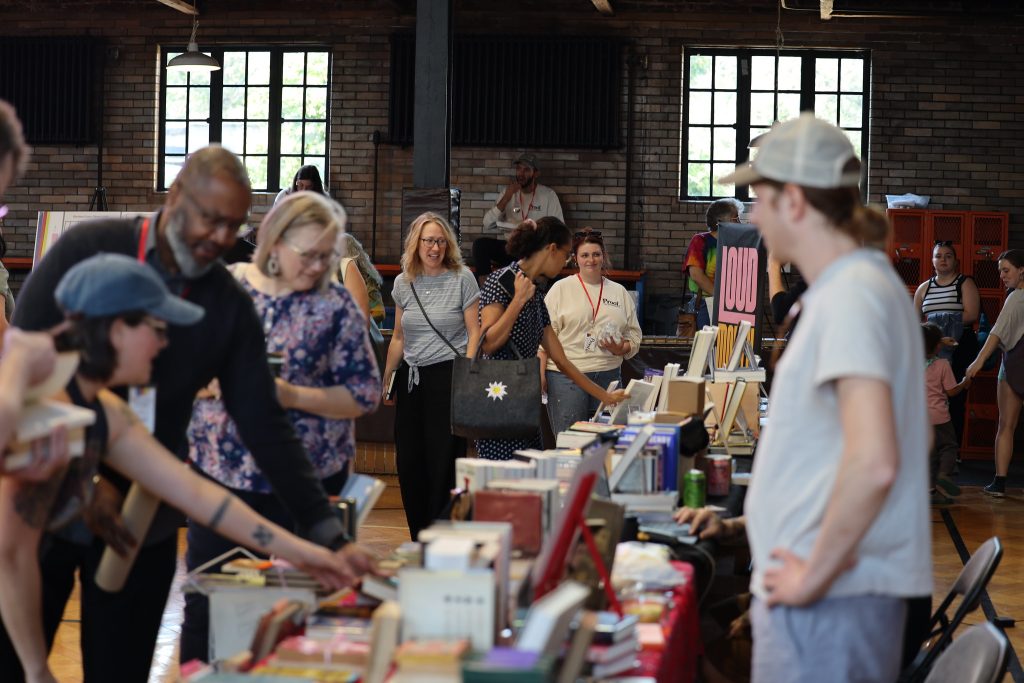
MD: Just to add to that, this idea of Indiana being overlooked—we always think about, you know, Illinois, especially Chicago, you think about Ohio now, you think about Michigan too, especially with Detroit. So it’s important for us [to emphasize what’s going on in Indy]. I think about what’s been here, we’re always thinking about the gaps, right? And we just dream about the things that we want to see, because I think that’s really as simple as it has to be. What would we really want to see and how would that change things? We’re always thinking about the arts and improving the quality of the community.
So we were like, what if we do this [lit fest]? And what if it’s free? The free thing is the big thing, right?
MD: Because we want to get more people here, we want to make you feel welcome. We want to put it in a neutral place that everybody feels like they can go to and not be excluded, and to just get the opportunity to do something that you might not even thought about before. It’s funny that with us in Indianapolis specifically, there’s so many schools and everybody has a reading series, but a reading series doesn’t always bring people together for workshops and conversations with authors and book fairs.
So there are all these things that you might be missing that are great, that are happening in terms of [Indy’s] literary art scene, whether it be these long standing open mics, poets, fiction writers, etc. We cover a lot of ground, but you might not notice that until somebody says, “Hey, let me show you all this together so you can take this all in.” So Proof is really a celebration, but it’s also a time to educate yourself. Even if you’re not a writer and you just love books and you love reading, you’re gonna have fun because you get to connect with those people. Just like Chantel and I did working together with Word As Bond, you’re gonna find some like minds in your community that really value the arts, the power of the arts, and what they can do.
CN: I love that. That’s super inspiring. Especially as someone who grew up in Indy and wanted to see this type of thing happening. When folks ask me about Indy, I say—and this can be seen as both a pro and a con—if you wanna see something, you’ll need to create it, but the benefit to that is that you get to shape it. You get to shape what it looks like and what it feels like, which is really exciting. Speaking of the shaping events, I was reading about Proof and there are bookshops that are going to be part of it, and also workshops. Can you talk a little bit about the programming and the curatorial vision?
MD: I’ve been here since 2006, and I’ve been teaching creative writing for a long time now. I know there’s people here, and we know there’s people—with Chantel having done workshops with Unlearned Arts. We’ve been having these discussions about more community-based teaching, and that goes to this other side of, maybe everybody’s not going to go to college and take a writing class, but what if we have an afternoon where you can go to a writing workshop and go get to practice craft and really see what that’s like? That was one of those things that was really important to us, it’s one of those things that kind of brings the walls down. Not everyone is going to go to college and have that opportunity, so how do we offer something that challenges that and opens the door to more people so it doesn’t feel like this really exclusive thing? That’s probably the thing that I’m most proud of with this. I just want to keep giving people opportunities to tap into their creativity. I think that’s a big motivation for us.
CN: Yeah, I think the workshop element is one of the details that really caught my eye, because I don’t see that a lot in like lit fests. Those kinds of workshops can be few and far between, specifically the free ones. I love that angle of keeping things accessible.You don’t have to be a “Writer”, you can just come to this workshop and just try it out. It’s opening those creative windows for folks.
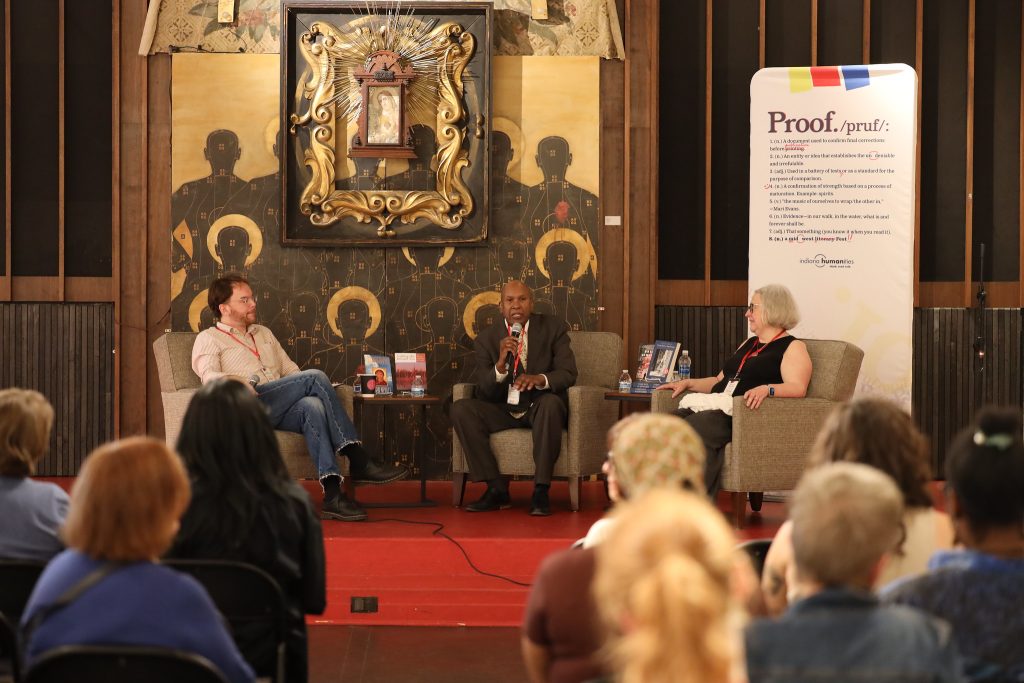
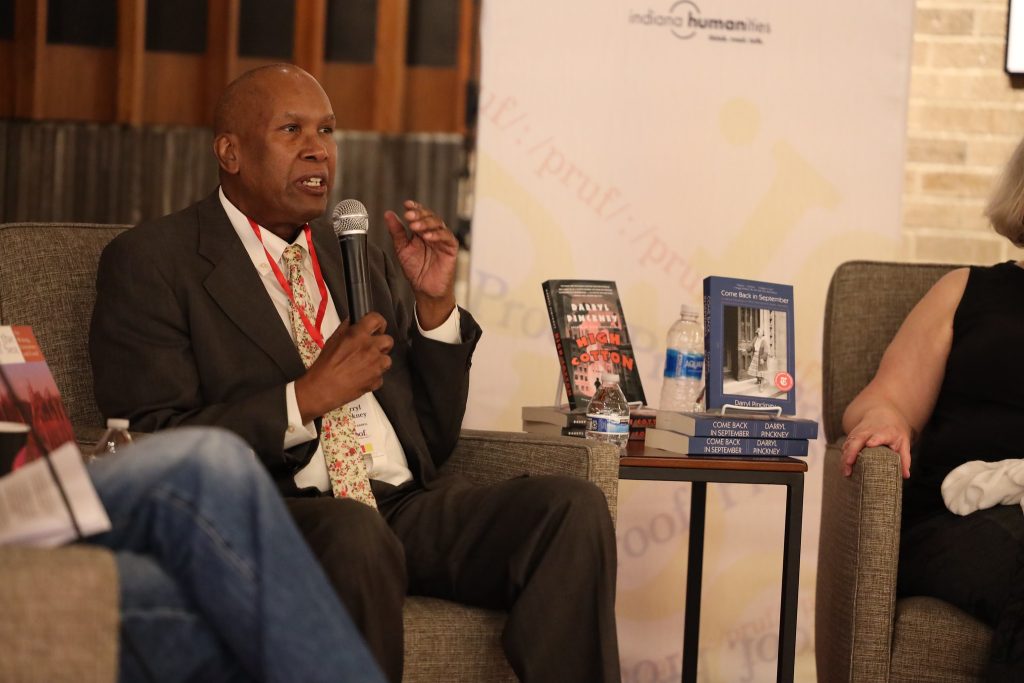
MD: It’s cool to think about all the different experience levels that are going to be there, right? There’s probably going to be people at a workshop for the first time, and then people that are like, I love taking fiction writing workshops and here’s an opportunity for me to do another one. What is it going to be like when those people get together? We really appreciate creating the opportunity.
CM: Absolutely. We definitely wanted it to be accessible to the community and then also wanted it to be a celebration of all genres. One of the things that we have been telling people is that this is really a collaborative effort—and by collaborative, I mean, bookstores were involved too. So there are bookstores who will have their own programming. The curation of how everything is kind of laid out also comes from their feedback and feedback from Indiana Humanities. We’re just striving for that dream of: what does it look like for it to be accessible with the given resources while also providing resources for all: writers, readers, and everyone in between?
[We also wanted to involve] all levels of writing, all aspects of writing, to really highlight resources for writers because I think a lot of times too, people don’t really know a lot of what is accessible to them in this city, as a writer and as a reader. There may also be some book clubs that’ll be present. We’re going to have an open mic, because we also want to encourage people to go to open mics—it’s not just for poets, it’s for people who would like to share their work. So that will be hosted by That Peace Open Mic and VOCAB, which are two phenomenal open mics that happen here in [Indy]. [We want to] dispel the [myth] that the written word and the spoken word always have to be separate, that one is doing more than the other. They really are like sisters and they just kind of function together. So hopefully there’s that conversation that I personally hope to rile up a little bit. [laughs] We hope to show and highlight all these moving parts in the literary community and encourage others to see how they are all working together.
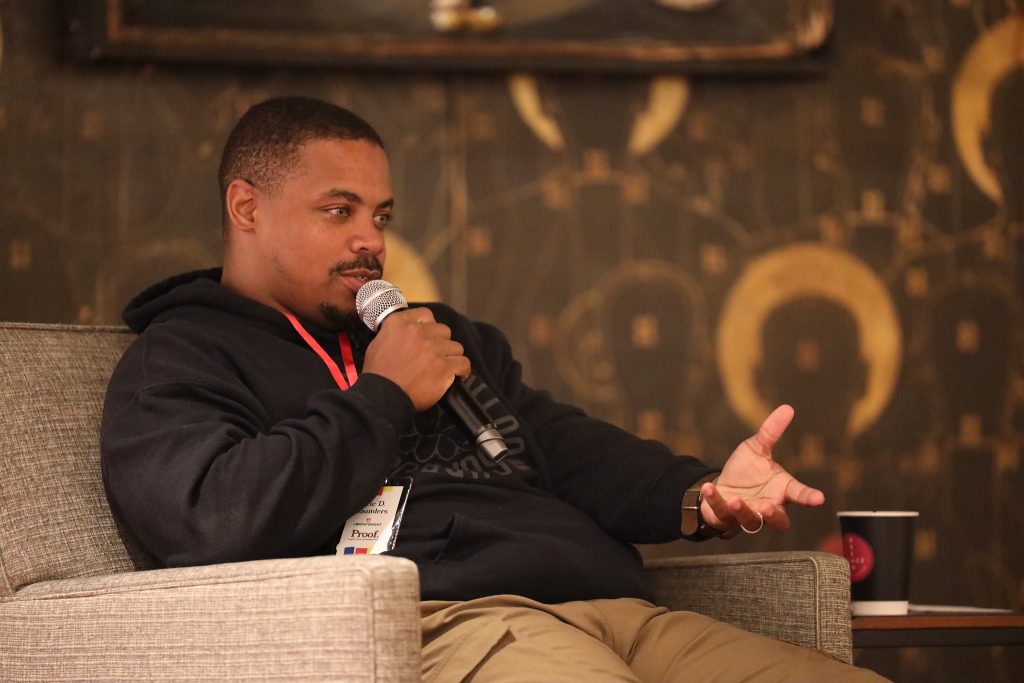
MD: This is really Chantel’s [contribution.] She’s an Indianapolis native and a long-time participant in these open mics. That’s something that she believes in and she stands up for all the time. It’s like, don’t forget about spoken word over here, that is one of our strengths. And not only is it one of our strengths, we have these long standing series, so you need to know about these places and these people that organize them. It’s great to have them on board [and at the Festival]. [The bookstores is also one] of our strengths—[Indy has] all these independent bookstores now. We’ve had this explosion! So at the festival, you’re going to have the Harrison Center, you’re going to have Indiana Humanities right across the street, you’re going to have Dream Palace Bookstore around the corner, and you’re going to have Loudmouth bookstore a couple blocks up. You get to travel to these different places and get familiar with the neighborhood, get familiar with the resources that are there, and start taking advantage of them. A lot of times it feels like all these pieces are spread out, but you bring them together and it’s like, yeah, all that stuff really is here, you know? I think about how cool it is that we have all those things.
CM: And it’s all connected. It doesn’t have to be one thing against the other. They’re working together, and we definitely hope to demonstrate that and start new types of conversations around the importance of literary arts. Cities like Chicago I would say have a different culture that really highlights the literary arts, whereas we’re hoping to demonstrate also the importance of the literary arts here in the Midwest and in Indiana as well. I just saw something from the Indy Arts Council about how they’re talking about taking art out of schools or literary arts out of schools. So hopefully Proof will give it that push and demonstrate the importance of literacy, the importance of storytelling, the importance of writing, the importance of community, the importance of the written and spoken word, and the people who do that. Because like Mitchell always says, art improves the quality of our lives. I agree with that and I hope Proof shows that.
CN: That was such a great explanation. I grew up going to the Harrison Center, and I also love Loudmouth. I feel like the past like three years, so many book shops have opened up in Indy, like Loudmouth, the Whispering Shelf, Tomorrow Bookstore…
CM: Yeah, they’re also one of the partners for Proof as well.
CN: Cool! It’s just amazing to see this explosion of bookshops. I also love what you’re saying about bringing all these spaces and things together. I think (and this can happen in really any city) that things sometimes get disjointed if it’s spread out, due to the layout of the city or how things are organized. I think Indy is such a word-of-mouth city, so taking that knowledge that you both have from being in those communities for so long, taking your experiential knowledge and putting it in a festival is really exciting.
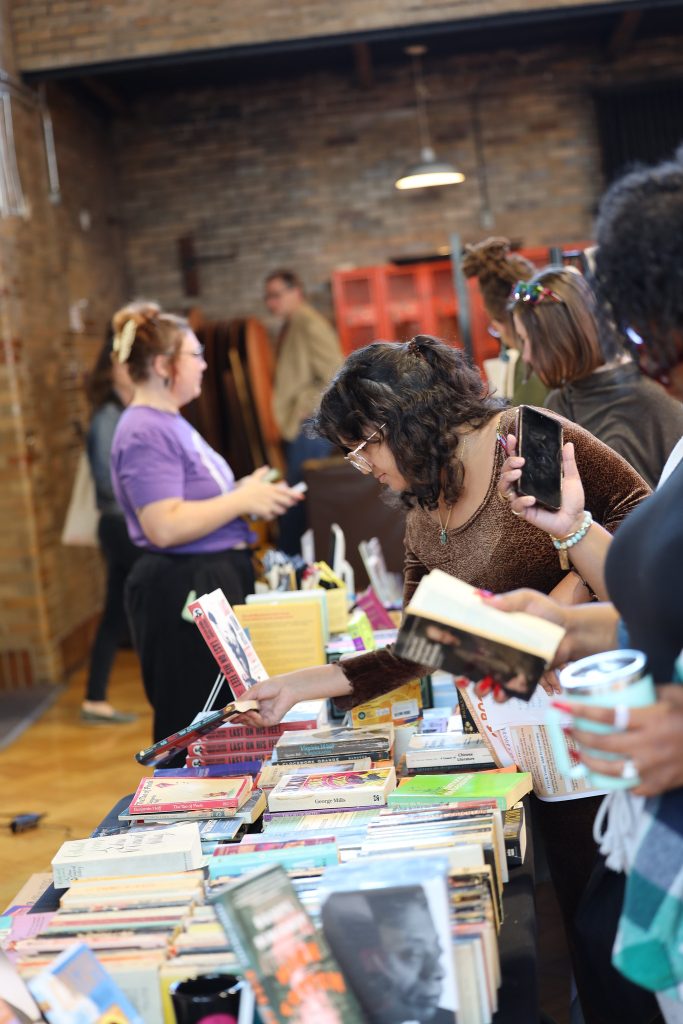
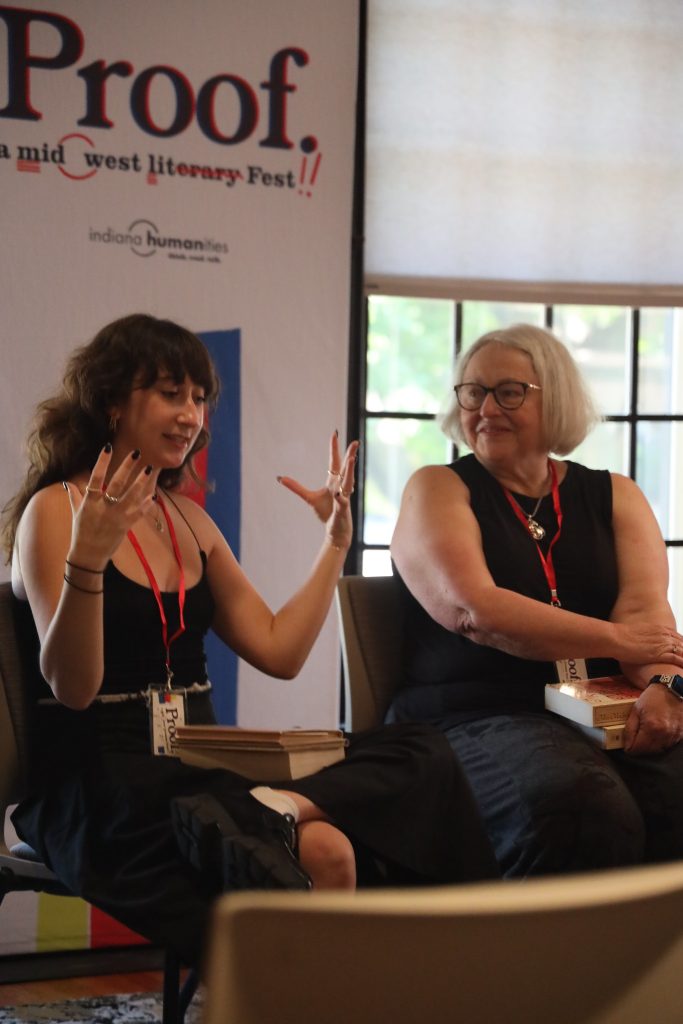
CN: Going back to what you’re saying about that “proof”—proof that things are happening, proof that the literary scene in Indy is robust, etc. It’s an interesting word because, I don’t know if you, y’all feel like this, but whenever I talk about Indy, people that don’t know about Indy or have never been to Indy talk about it as if, because they don’t know what’s going on, they assume nothing is going on. And that’s not the case. That burden of proof is so often put on the artist or on the writer to prove something. But if you’re in that community, you know. Just because they don’t know doesn’t mean it doesn’t exist. I think part of that is like how the media covers things or doesn’t cover certain things in certain areas. I want to flip that narrative of like, “we have to prove this to you.” Instead, I see it as, “this is proof that you’re wrong.”
MD: That’s what we hope people think about the name of the festival. A “proof” [is] a manuscript that is passed on. A proof opens up the opportunity for revision, right? We’re actually revising the story of, oh, there’s nothing going on here, right? That’s also what the festival is doing. The festival is a revision of that idea that nothing is going on in Indianapolis. No, there’s actually quite a bit—and not just in Indy, but the Midwest, too. We’re revising that old narrative.
CM: We’re providing that proof with the bookstores, with the writers, with the conversation pieces, with the location that we’re in. We’re just providing the proof. It’s not even that there’s anything to prove, it’s already here. That’s also why we called it Proof. The Midwest is a space that has strong literary art connections, literary art roots. Indiana is a place that has strong literary arts connections and roots as well, even just thinking about Mari Evans and Etheridge Knight and so many other people.
For us, that’s where we started with our partnership with Indiana Humanities, so I think a lot of this is proof that it’s rooted in like a legacy that we are here. It’s a reminder of that, a celebration of that, and hopefully it can be a continuation of a good poet nature providing good questions. What, what does proof mean? Where is proof going? What other proof is out there? What is left to prove? Why is this important? All those kinds of questions we hope to just push and encourage. I don’t think we’re coming to this as somebody with answers, but more so with questions of what could this be. What has been here? What has been looked over? What can we celebrate? I think that’s the point of revision, the question of, what can this manuscript really be? What can this community really be? What is it doing? We don’t come to this with answers, we come to it with dreams and curious questions, and hopes, of course.
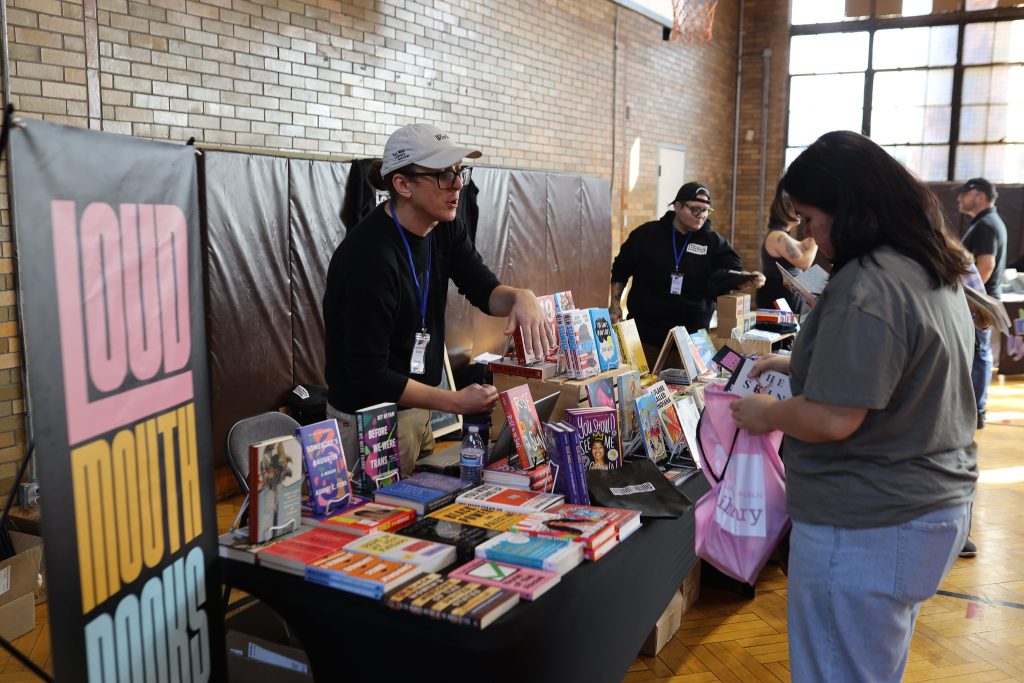
CN: I love that revision element! Revision means you’re still learning, which is really special. And I know it’s a little early to ask this, but is the intention to do another festival each year?
CM: We hope so!
MD: That’s the kind of dreamers we are. We don’t see this as a one and done kind of thing, you know? Being so excited about it because we’re just days away from it, you can’t help but think, what could happen after? We’re gonna get through this first one—the potential is great.
CN: That is really exciting. I was wondering, will you two be reading at the festival or have a place in the festival?
MD: Yeah, we both will be, actually. We love the format of the artist interview and these conversations, so we’re both, um, going to be doing events like that during the festival. Adrian Matejka is going to come back from Chicago and read. He’s going to read from his Jack Johnson poems and we’re going to have a conversation about that. Chantel has an artist talk in that same vein, Januarie York.
CM: Yes. [Januarie York] was the first poet laureate of the Center for Black Literature & Culture here in Indy and a phenomenal spoken word poet. I’ll be having a conversation with her and I’m pretty excited about it.
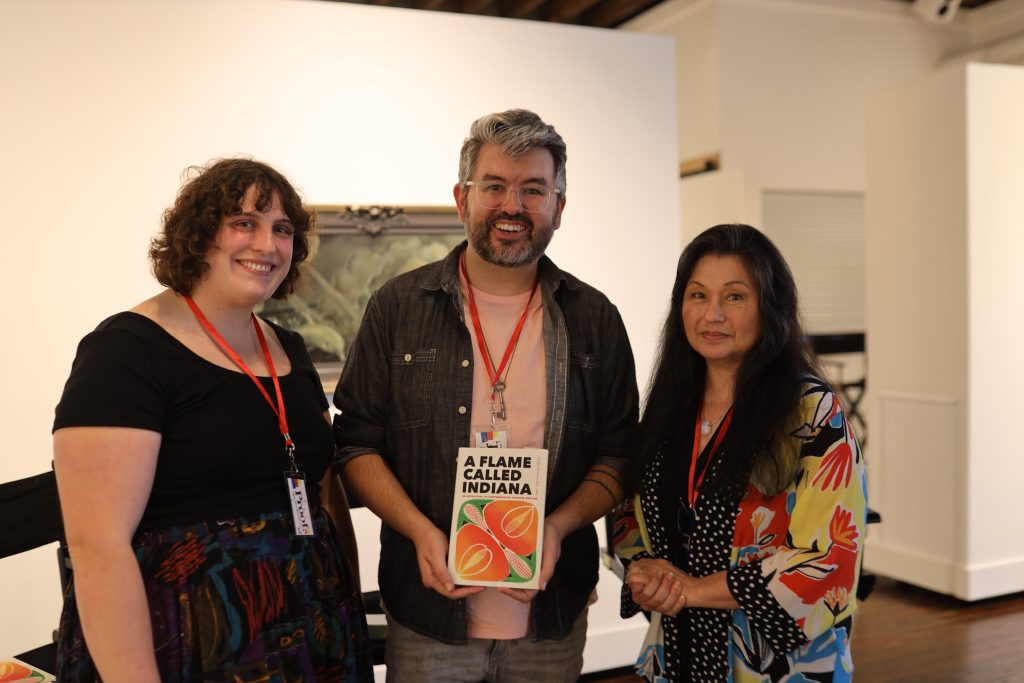
CN: Both of you have answered all my questions so generously, so thank you so much. I’d love to end on a question about Indy’s lit community specifically. What is one thing you really love about it, whether it be a favorite bookstore, a favorite open mic, an element of the community that you like?
CM: I don’t know if there’s anything I love the most, and I say that because I find all of it useful, all of it rich and enjoyable for myself. I enjoy the community. We’re just coming off of our second year of doing Line Break, which is a writer’s retreat that is also another dream project highlighting entrepreneurship as a writer. So coming off of that weekend I felt very full and renewed and inspired to continue to dream. And I don’t think that has anything to do with any one particular thing other than just the community that currently exists. There’s always opportunities to connect with the writers—it’s a rich community. It feels like it’s looking for you as much as you’re looking for it. You just have to find it, and then when it happens, you just feel renewed as a writer. I’m glad to be here and learn that for myself. I think that in itself is just a good thing. It’s continuously growing and asking for us to reconnect, which is always a good ask from a literary community.
CN: Thank you. That was a great answer.
MD: I’m just going to steal Chantel’s answer. It’s not even a specific place, it’s the people. I just love going to readings, going to different events and just seeing the artists, seeing the writers, and just knowing that we’re in this together. It’s like Chantelle is saying, that’s part of the power of it. I not only appreciate it, but I really like this community. I like these people and I like this energy, you know? It makes a difference.
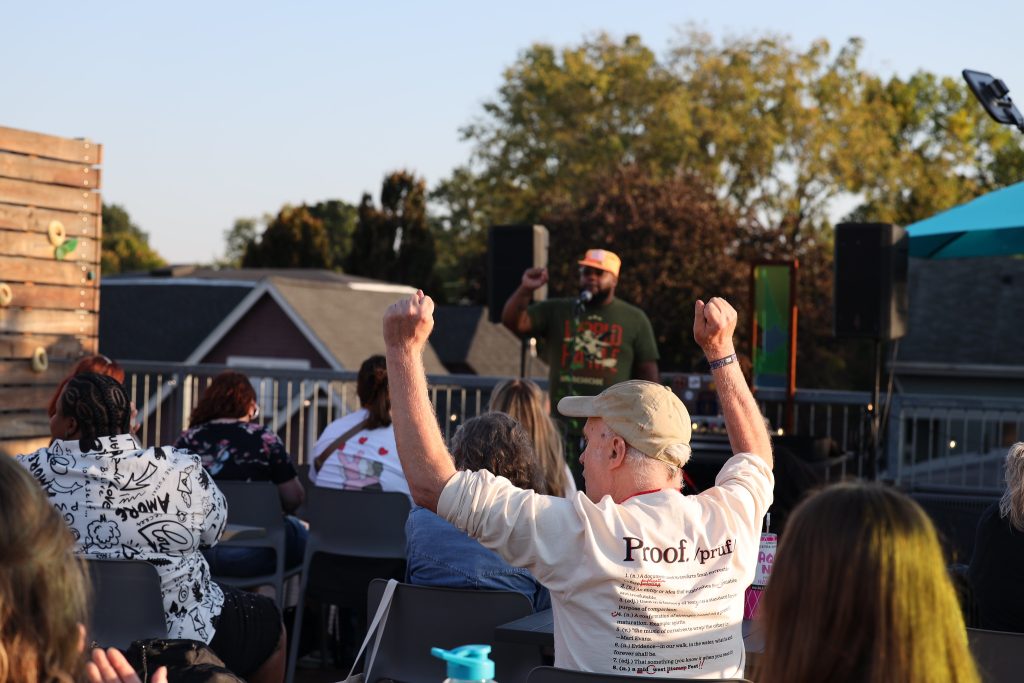
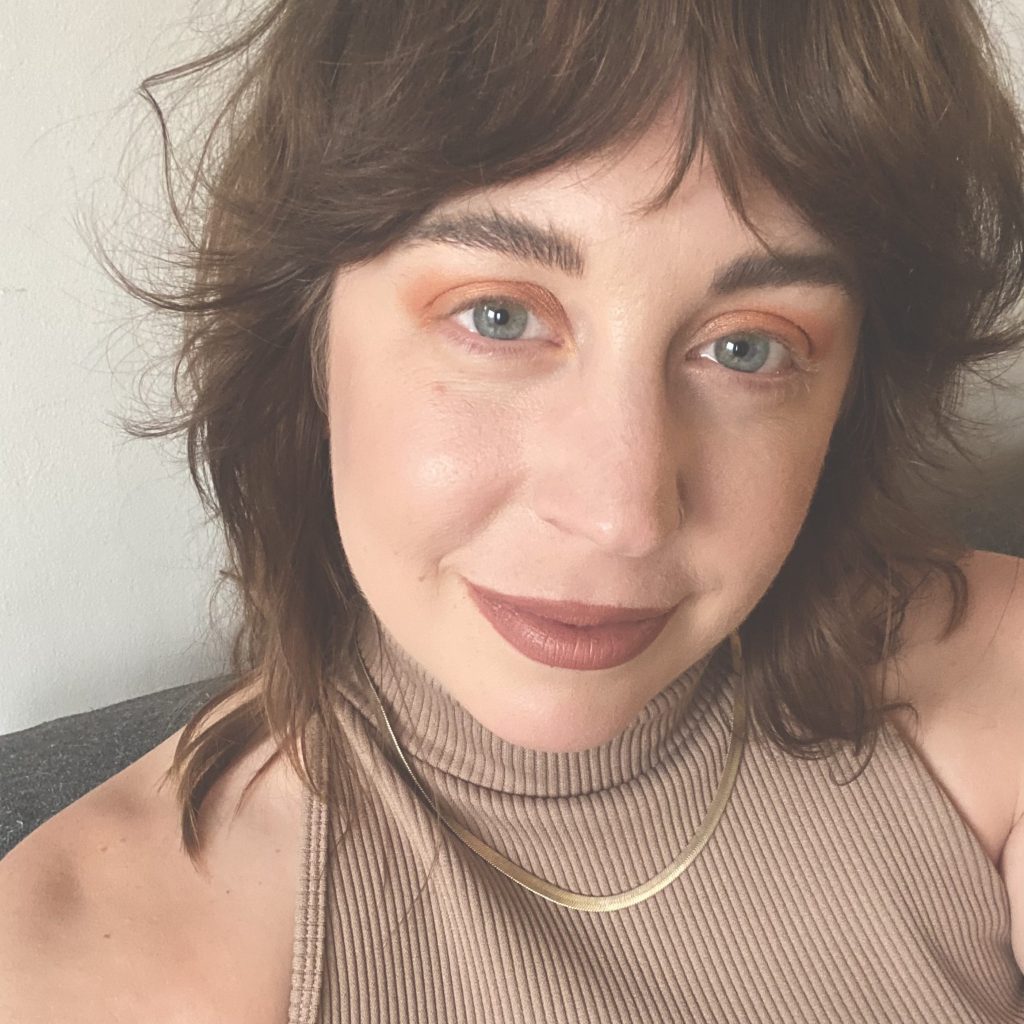
About the author: Christina Nafziger is a writer, editor, critic, and curator based in the occupied lands of so-called Chicago. Earning an M.A. in Contemporary Art Theory from Goldsmiths University of London, her research focuses on the effect photo collections and archiving have on memory and identity and the potential capacity these collections have in altering and editing our current futures. Within her writing practice, she is interested in the intersection of art, labor, and power as well as the ways in which location affects identity and art making in the Midwest.
